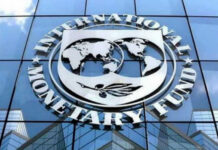WB cautions against risks
A strong domestic demand is at work this year in a relative political peace and the economy is poised to grow by 6.2 percent under the current fiscal 2014-15 mainly pushed by revival in private investment activities and remittance flow.
World Bank (WB) chief economist at its Dhaka Office Zahid Hussain made the projection last week while speaking at a function to releasing the Bangladesh Development Update at the Bank’s local office in the city. The growth will come with the upward investment trend without any huge jump to investment, he said.
Earlier WB’s country director for Bangladesh, Johannes Zutt unveiled the report to the newsmen attending the event. Hussain said the economy’s natural capacity is sufficient to achieve the more than 6 percent growth.
But the report did not fail to sound caution against political risks. It said a resurgence of political unrest, even if it is not as ferocious and as long as experienced in the last half of 2013, may jeopardise the near term growth.
“This will depress private investment, push up inflation and potentially put reserves under pressure,” the report said laying emphasis on maintaining political confidence to steer the economy to upward growth. .
The Economic update said the 6.2 percent growth will fall short of targeted 7.2 percent growth and to achieve it the country should have to raise the stagnant investment-GDP ratio to 35 percent from the present 28.7 percent. It requires an investment boom, he said.
Hussain said the country should complete Dhaka-Chittagong and Dhaka-Mymensingh highways, double-tracking of Dhaka-Chittagong Railway, end Padma bridge construction, Dhaka metro rail project and the two Bibiyana gas field-based large power plants. These investments will push the investment-GDP ratio by more than six percentage points to achieve the higher growth target.
Even 8 percent GDP growth is possible if these projects can be completed, he said.
He said agriculture is expected to grow by 2 percent this year down from last fiscal’s 3.3 percent. Industry will grow by 9.5 percent against 8.4 percent during last fiscal and the services sector may grow by 6.1 percent from 5.8 percent, according to the forecast presented by the World Bank.
The World Bank estimate suggests that poverty incidence, based on national poverty
line of $1.13 per capita per day, is projected to decline from 31.5 percent in 2010 to 24.47 percent by 2014.
This “remarkable progress” in poverty reduction is attributable to a decline in
population growth and changing age structure, increases in labour income, internal and external migration, improved connectivity and the government’s targeted safety net programme.
“The expected decline in the poverty rate is not a result of any survey — rather, it is
based on assumption. But, it is realistic,” he said. On the WB’s assumption, he said the dynamism of the economy has remained the same or even improved compared to the performance between 2000 and 2010 when poverty was cut by 1.74 percentage points annually.
The WB also said the income of the bottom 40 percent is likely to have continued to increase because of increased employment and wages. It said lack of visible progress in upgrading labour and safety standards in garment factories could trigger loss of preferential access to the European Union markets.
The inability to reopen job opportunities in the Middle-East clouds the sustainability of remittance growth. “These are high impact risks, particularly when combined with the possibility of a protracted slowdown in advanced economies.”
The WB said even if all the conditions are growth friendly, growth may still elude unless there is enough confidence about political stability and policy continuity.
The global lender said the deterioration in state banks’ financial solvency could challenge fiscal sustainability and constrain the availability of resources for public investment.
An oil price shock from heightened geopolitical tensions in the Middle East, or a protracted slow growth in trading partner economies, may also adversely affect inflation and the balance of payments of Bangladesh, the report said.
Source: Weekly Holiday









